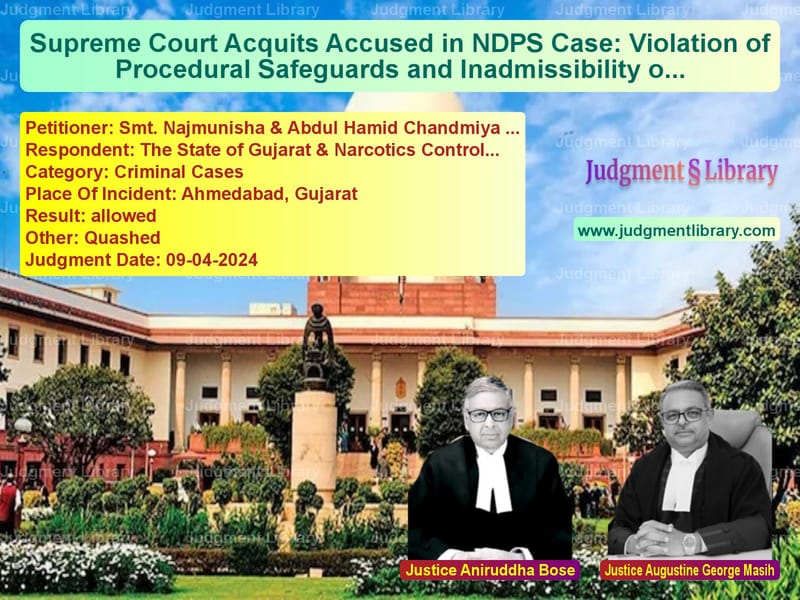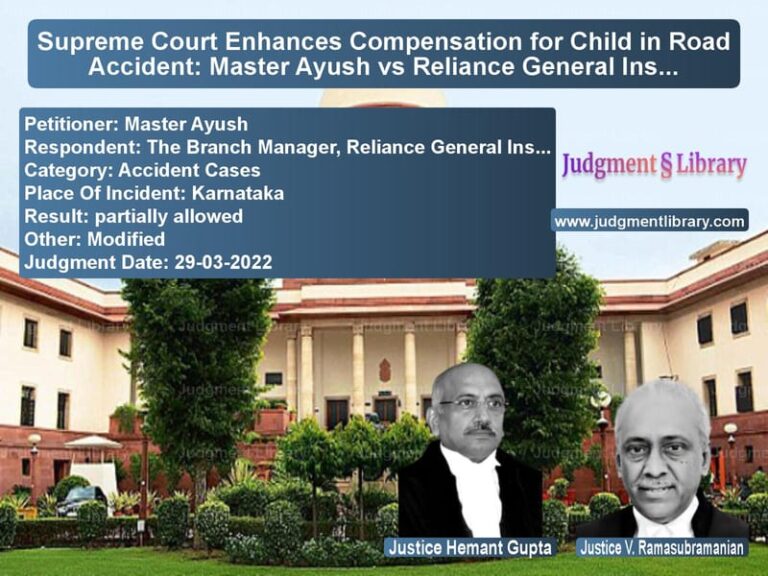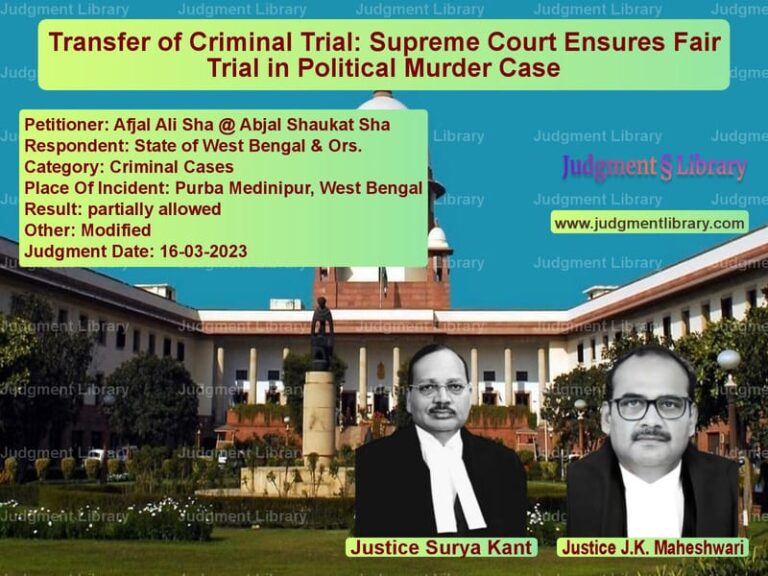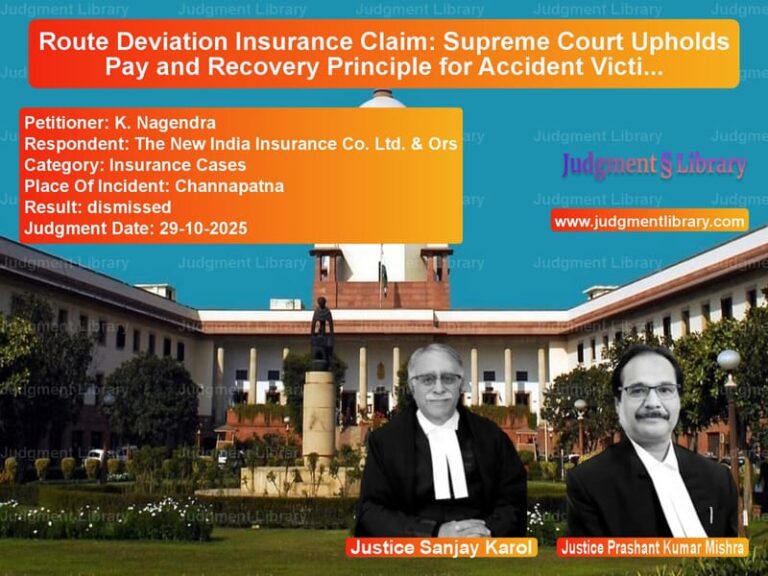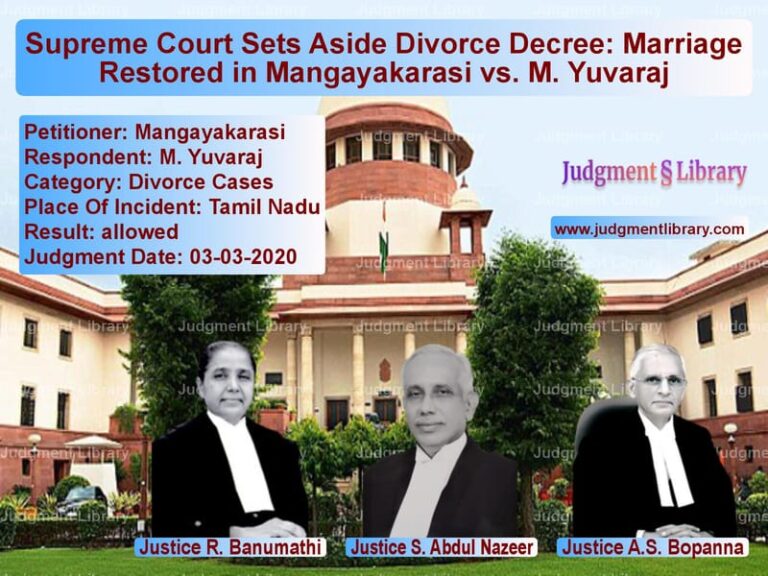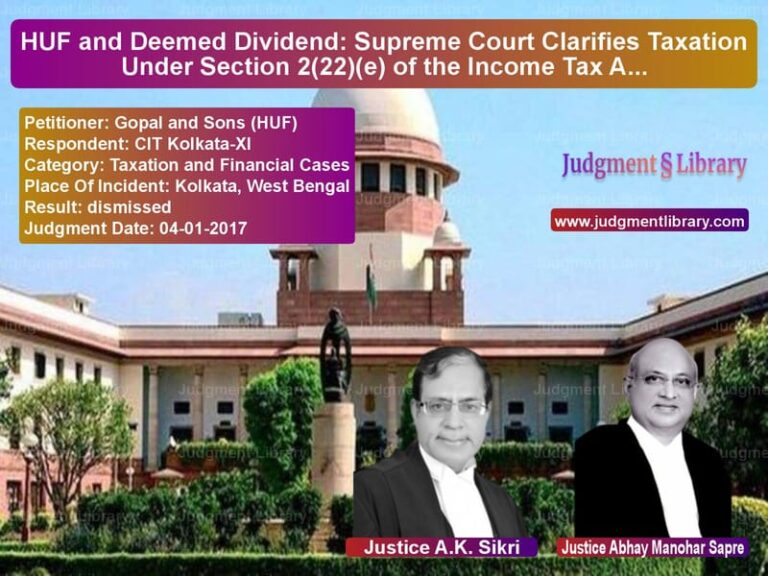Supreme Court Acquits Accused in NDPS Case: Violation of Procedural Safeguards and Inadmissibility of Confessions
The case of Smt. Najmunisha & Abdul Hamid Chandmiya alias Ladoo Bapu vs. The State of Gujarat & Narcotics Control Bureau is a landmark judgment addressing the critical procedural lapses under the Narcotic Drugs and Psychotropic Substances Act, 1985 (NDPS Act). The Supreme Court ruled on the admissibility of confessional statements under Section 67 of the NDPS Act and whether the failure to comply with statutory safeguards for search and seizure rendered the convictions unsustainable.
The appellants, Najmunisha and Abdul Hamid Chandmiya, were convicted by the trial court for their alleged involvement in drug trafficking. They were sentenced to rigorous imprisonment, with Najmunisha receiving ten years and Chandmiya thirteen years. The Gujarat High Court upheld their convictions, modifying only the fine imposed on Najmunisha. However, the Supreme Court overturned the conviction, ruling that procedural violations and reliance on inadmissible confessions made the case untenable.
Background of the Case
The case originated on December 10, 1999, when Mrs. Krishna Chaube, an intelligence officer, received a tip-off that Abdul Hamid Chandmiya would be transporting narcotic substances in an auto-rickshaw (GJ-9T-2355) through Shahpur Darwaja, Ahmedabad, the next morning. The Narcotics Control Bureau (NCB) planned a raid on December 11, 1999.
When the raiding party attempted to stop the vehicle, the driver allegedly fled, abandoning the auto-rickshaw. Upon searching the vehicle, the officers recovered 1.450 kilograms of charas. This led the officers to conduct a search at the accused’s residence, where they allegedly found an additional 2.098 kilograms of charas. Najmunisha was arrested on the spot, while Abdul Hamid Chandmiya was apprehended later.
During interrogation, both accused allegedly made confessions under Section 67 of the NDPS Act, admitting to their involvement in drug trafficking. These statements played a key role in their conviction at trial.
Key Legal Issues
- Whether the search and seizure were conducted in compliance with the procedural safeguards under Sections 42 and 50 of the NDPS Act.
- Whether confessions recorded under Section 67 of the NDPS Act are admissible in court.
- Whether procedural lapses in obtaining search authorization invalidated the prosecution’s case.
- Whether the accused were denied a fair trial due to violations of statutory provisions.
Arguments by the Appellants
The appellants’ counsel raised several objections regarding procedural lapses:
“The raid at the house was not based on prior information but was conducted arbitrarily, violating the safeguards under Sections 42 and 50 of the NDPS Act.”
They further argued that the alleged confessions under Section 67 of the NDPS Act were inadmissible following the Supreme Court’s ruling in Tofan Singh vs. State of Tamil Nadu (2021), which held that statements recorded under Section 67 cannot be treated as confessions.
Arguments by the Respondents
The prosecution countered by asserting:
“The prosecution followed all legal procedures, and the statements recorded under Section 67 were voluntary. The search at the house was a continuation of the initial raid.”
The prosecution maintained that minor procedural lapses did not affect the overall validity of the case.
Supreme Court’s Analysis
The Supreme Court analyzed the case from two primary angles: procedural violations and evidentiary admissibility.
1. Violation of Search and Seizure Procedures
The Court scrutinized the manner in which the search and seizure were conducted. Section 42 of the NDPS Act mandates that officers must have prior written information before conducting a search, and if such a search is conducted at night, they must record the reasons in writing.
The Court found that the search at the accused’s residence was not based on prior written information and stated:
“The search at the accused’s house was conducted without proper authorization and was not based on prior information. This amounts to a violation of statutory safeguards under Section 42 of the NDPS Act.”
The Court further noted that there was no independent witness during the house search, raising concerns about the integrity of the procedure.
2. Inadmissibility of Section 67 Statements
The Court relied on its previous ruling in Tofan Singh vs. State of Tamil Nadu, which held that statements recorded under Section 67 of the NDPS Act do not qualify as confessions. The Court ruled:
“Confessional statements recorded under Section 67 of the NDPS Act cannot be used as evidence to convict an accused.”
Since the trial court had relied heavily on these statements for conviction, the Supreme Court held that the conviction was unsustainable.
Precedents Considered
The Supreme Court referred to several past judgments:
- Tofan Singh vs. State of Tamil Nadu (2021) – Statements under Section 67 of the NDPS Act are not admissible as confessions.
- State of Punjab vs. Balbir Singh (1994) – Failure to comply with procedural requirements under Section 42 vitiates the prosecution’s case.
- Karnail Singh vs. State of Haryana (2009) – Non-compliance with Section 42 cannot be overlooked unless justified by special circumstances.
Final Judgment
Considering the procedural violations and the reliance on inadmissible evidence, the Supreme Court ruled in favor of the appellants:
“The procedural lapses, coupled with reliance on inadmissible confessions, render the prosecution’s case untenable. The appellants are entitled to the benefit of the doubt.”
Accordingly, the Supreme Court acquitted Najmunisha and Abdul Hamid Chandmiya, setting aside the Gujarat High Court’s ruling.
Key Takeaways from the Judgment
- The ruling reinforces that procedural safeguards under the NDPS Act must be strictly followed.
- Statements recorded under Section 67 of the NDPS Act cannot be used as confessional evidence.
- Searches and seizures must be based on prior written information or valid reasons must be recorded.
- Failure to comply with statutory safeguards can result in the prosecution’s case being dismissed.
Judgment Date: April 9, 2024
Judges: Aniruddha Bose, Augustine George Masih
Petitioner Name: Smt. Najmunisha & Abdul Hamid Chandmiya alias Ladoo Bapu.Respondent Name: The State of Gujarat & Narcotics Control Bureau.Judgment By: Justice Aniruddha Bose, Justice Augustine George Masih.Place Of Incident: Ahmedabad, Gujarat.Judgment Date: 09-04-2024.
Don’t miss out on the full details! Download the complete judgment in PDF format below and gain valuable insights instantly!
Download Judgment: smt.-najmunisha-&-ab-vs-the-state-of-gujarat-supreme-court-of-india-judgment-dated-09-04-2024.pdf
Directly Download Judgment: Directly download this Judgment
See all petitions in Drug Possession Cases
See all petitions in Custodial Deaths and Police Misconduct
See all petitions in Judgment by Aniruddha Bose
See all petitions in Judgment by Augustine George Masih
See all petitions in allowed
See all petitions in Quashed
See all petitions in supreme court of India judgments April 2024
See all petitions in 2024 judgments
See all posts in Criminal Cases Category
See all allowed petitions in Criminal Cases Category
See all Dismissed petitions in Criminal Cases Category
See all partially allowed petitions in Criminal Cases Category

